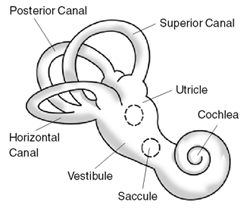Meniere's Disease
| Ménière's disease | |
|---|---|
| Synonyms | Ménière's syndrome, idiopathic endolymphatic hydrops |
 |
|
| Diagram of the inner ear | |
| Pronunciation | /meɪnˈjɛərz/ |
| Classification and external resources | |
| Specialty | otolaryngology |
| ICD-10 | H81.0 |
| ICD-9-CM | 386.0 |
| OMIM | 156000 |
| DiseasesDB | 8003 |
| MedlinePlus | 000702 |
| eMedicine | emerg/308 |
| MeSH | D008575 |
| Orphanet | 45360 |
Ménière's disease (MD) is a disorder of the inner ear that is characterized by episodes of feeling like the world is spinning (vertigo), ringing in the ears (tinnitus), hearing loss, and a fullness in the ear. Typically only one ear is affected, at least initially; however, over time both ears may become involved. Episodes generally last from 20 minutes to a few hours. The time between episodes varies. The hearing loss and ringing in the ears may become constant over time.
The cause of Ménière's disease is unclear but likely involves both genetic and environmental factors. A number of theories exist for why it occurs including constrictions in blood vessels, viral infections, and autoimmune reactions. About 10% of cases run in families. Symptoms are believed to occur as the result of increased fluid build up in the labyrinth of the inner ear. Diagnosis is based on the symptoms and frequently a hearing test. Other conditions that may produce similar symptoms include vestibular migraine and transient ischemic attack.
There is no cure. Attacks are often treated with medications to help with the nausea and anxiety. Measures to prevent attacks are overall poorly supported by the evidence. A low salt diet, diuretics, and corticosteroids may be tried.Physical therapy may help with balance and counselling may help with anxiety. Injections into the ear or surgery may also be tried if other measures are not effective but are associated with risks. The use of tympanostomy tubes, while popular, is not supported.
Ménière's disease was first identified in the early 1800s by Prosper Ménière. It affects between 0.3 and 1.9 per 1,000 people. It most often starts in the 40s to 60s. Females are more commonly affected than males. After 5–15 years, the episodes of world spinning generally stop and the person is left with mild loss of balance, moderately poor hearing in the affected ear, and ringing in their ear.
...
Wikipedia
